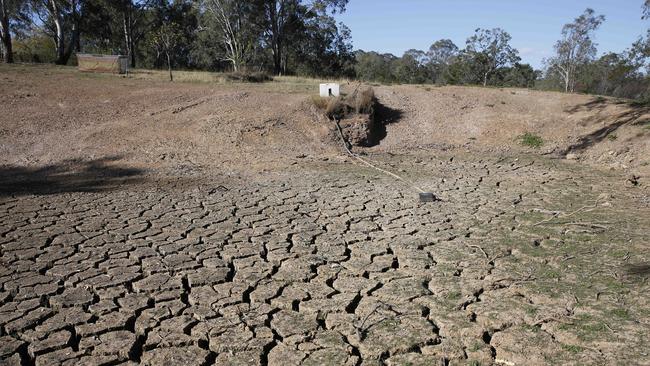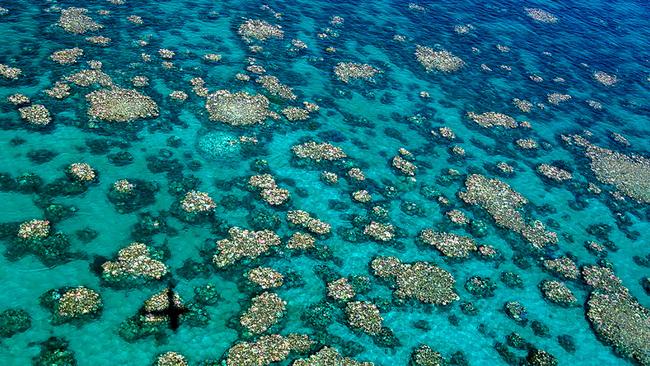The terrifying report our pollies are ignoring
THE release of a grim climate change report shows it’s almost too late to save the earth. It should be impetus for our politicians to do something, writes Dennis Atkins. But they’ve put their hands over their eyes.
SCOTT Morrison gave a shoulder shrug of a response to the latest Intergovernmental Panel on Climate Change report released this week in South Korea.
Morrison breezily says Australia will meet the emission-reduction targets set under the Paris Agreement adopted by consensus in 2015 and signed by Tony Abbott.
This is at best debatable, but there’s no “there” there because when the Coalition ditched Malcolm Turnbull, they also got rid of the weak national-energy guarantee which, on the Government’s own figures, would have reduced emissions by 2 per cent. Put the champagne on ice!
The Government and its new environment minister, Melissa Price, say to the extent we have an emissions policy it’s about technology — which seems to refer to whatever method is in place and what the market might throw up.
There’s no set policy and industry has no clear direction or certainty — the situation that has prevailed for the past eight or nine years.

Let’s get back to that IPCC report that dropped in Incheon, South Korea. It might not have rung any alarm bells in Canberra, but it was the most alarming document to come out of the UN process going back to the original international conference in Brazil in 1992.
Essentially an update of where things are, the report is being described by informed and credible scientists in the most urgent terms.
An author of previous IPCC reports, Bill Hare a physicist with Climate Analytics, calls it “quite a shock and quite concerning”.
“We were not aware of this just a few years ago,” Hare said. The “this” he’s talking about is that the critical point of warming that has been charted by climate scientists for
three decades is getting closer at a faster pace.
It was thought previously the critical point was going to be warming of 2C above pre-industrial levels, and this itself would have catastrophic impacts on how we live and the environment around us.
Scientists believed this level — which would come over a longer time frame that is now being measured — would trigger severe effects of climate change.
Now, the IPCC says by 2040, the global temperature will have increased by 1.5C and the impacts being modelled for a 2C hike will arrive.
The Coalition says we shouldn’t worry too much because Australia is responsible for at most 1 per cent of global emissions, but to close your eyes tight and put your hands over your ears is not a policy response.
Yes, Australia is a relatively smaller emitter but we live in a global environment and cannot avoid the impacts of global climate change.

This week we’ve had some of the first summer storms, which is normal, but not all of these storms appearing in the atmosphere are showing up as thunder, lightning, rains and the rest.
One reason is that because the air is warmer, more storms are burning off. This means when storms do arrive, they are bigger and potentially more damaging.
Many people will shout loudly if there’s a line drawn between afternoon Brisbane storms and climate change, but thousands of reputable scientists are drawing just such links.
After all, facts are not something you can conjure conveniently to fit a pre-cooked conclusion.
Science-based facts are unavoidable, such as greenhouse gas emissions, which is the measurable atmospheric concentration of carbon dioxide, and now exceeds 410 parts per million — the highest-recorded level in 800,000 years.
Already, global average surface temperatures are 1.2C higher than they were before the industrial revolution, which started in 1760.
A unique response to climate change has come from three New Yorkers — all billionaires — who could never be described as alarmists.
Former NYC mayor and head of his eponymous financial, software, data, and media company, Michael Bloomberg; former merchant banker and George W. Bush’s treasury secretary Hank Paulson; and Thomas Fahr Steyer, a hedge-fund manager, philanthropist and environmentalist set up a foundation, Risky Business.
It’s worth looking at their website (riskybusiness.org), which goes deep into the threats posed by climate change and the enormous business opportunities these guys see in getting the world out of this almighty mess we’re in.
In my humble opinion, there’s not a moment to lose.
Dennis Atkins is The Courier-Mail’s national affairs editor.
Originally published as The terrifying report our pollies are ignoring
